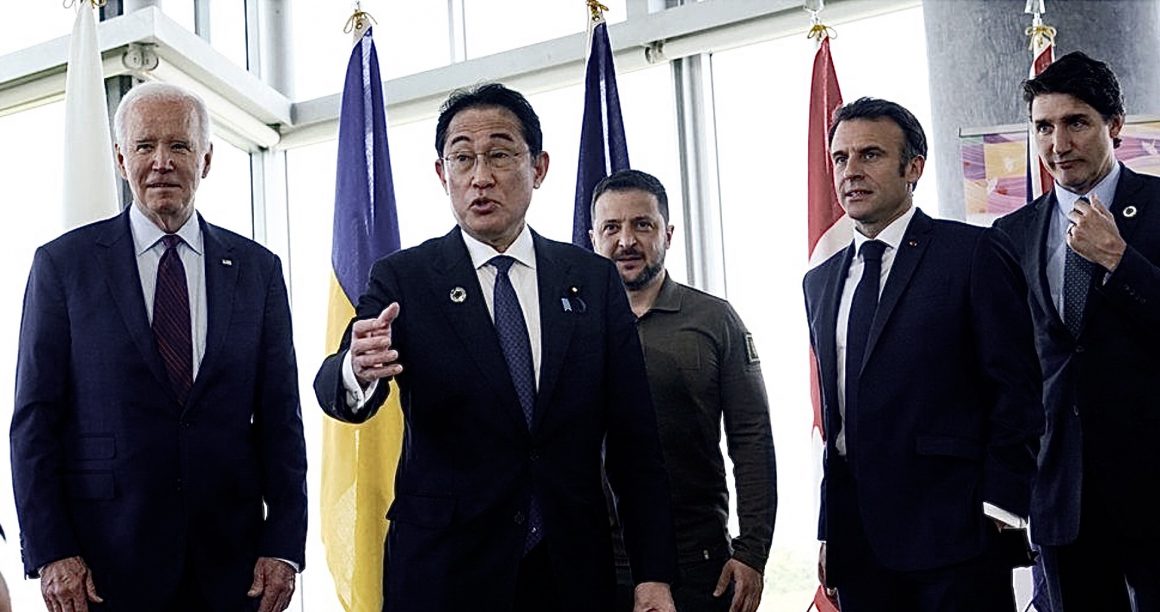For the members of the proletarian movement, the most important thing about the Ukraine proxy war is not that Russia has won the conflict’s battles. The U.S. empire always saw Ukraine as nothing more than a sacrificial tool for trying to destabilize Eurasia, and was never materially invested in it militarily defeating Russia. The important thing is that Russia has won the economic war, and did so long prior to its recent Bakhmut victory. The military aspect has been secondary. Ukraine could have retaken Crimea, and because Russia couldn’t be destabilized by the sanctions, the war still would have represented a net loss for the imperialists.
The U.S. would still have started a war that accelerated its own social decline, putting the American and European working classes in an even worse economic situation than they already were. And the imperialists still wouldn’t have managed to throw Eurasia into chaos, which is the only thing that could have made Washington’s strategic investment in Ukraine truly pay off. The future stability of American capitalism depended on Washington gaining the leverage, via a Russian balkanization, to be able to subdue China and reverse the BRI’s damage towards neo-colonialism. Because this hasn’t happened, the system our ruling elites operate off of can only continue to fall apart.
Even within this wider context, the fall of Bakhmut, and the other parts in the wave of Russian victories that it represents, is significant in that it creates a new opportunity for communists. It’s given us a way to show the people that their ruling class, the ruling class media, and imperialism’s online narrative enforcers have been lying this entire time. Because we must never forget that less than a year ago, these actors were aggressively promoting the idea that Ukraine’s military victory was inevitable, and even that it had come into being by that point.
Last fall, when Ukraine gained a series of localities, they said that this meant the war was as good as over. They said Russia’s continuing to fight was futile. They ignored how these “victories” for Kiev were hollow ones. How they had come at the cost of leaving Ukraine vulnerable in more long-term ways; how they showed a myopic focus by the Ukrainians on gaining soil for its own sake, rather than on what would have been strategically optimal; how these “victories” represented a waste of increasingly sparse Ukrainian resources; how Russia had a vastly greater amount of manpower and equipment at that stage; how even the USA’s surplus was getting exhausted; how all of these things were symptomatic of Russia’s military industry being state-run, and therefore largely free from the corruption which handicaps America’s absurdly privatized arms manufacturers. They ignored all of these factors so that they could keep selling an illusion.
This was the illusion that even though by that point, the sanctions had already been revealed to be not nearly as effective as Washington’s analysts initially promised, this war was ultimately going to be proven worthwhile from a pro-American perspective. That because of Ukraine’s supposedly having made its military victory guaranteed, Russia would ultimately fall, and Washington’s hegemonic status would be restored. This narrative was meant to appeal to the dark, cynical side of the American and European psyches during the era of late capitalism. The side that wants not to rectify the crimes we’ve been complicit in as citizens of the imperialist countries, but to commit even more crimes so that we can gain greater extractive benefits. And thereby to save ourselves from the perils of late capitalism, not through ending capitalism but through stealing more labor and resources from the global “have-nots.”
Appealing to this selfish mentality will only be effective on a minority of Americans. Most in the U.S. aren’t labor aristocrats or bourgeois, they’re proletarians or lower. This is what Lenin was talking about when he wrote in Parasitism and the Decay of Capitalism: “The distinctive feature of the present situation is the prevalence of such economic and political conditions that are bound to increase the irreconcilability between opportunism and the general and vital interests of the working-class movement.” Only a minority of the USA’s people, and of the country’s workers even less so, are wealthy enough to have a primary material interest in the continuation of imperial extraction. Most of them have more to gain than to lose from proletarian revolution. This is evident in how almost two-thirds of Americans have come to live paycheck to paycheck after this last year’s inflation increase.
When the majority lack a primary material incentive to support imperialism, imperialism’s psyops will only work on them as long as they aren’t exposed to the anti-imperialist perspective. And we know the majority lack this incentive because at this stage in American capitalism’s decline, further austerity is the only future the country’s working class can expect. At least as long as we stay under the present system. Even if the proxy war had been successful, and Eurasia had been destroyed, it’s not like neoliberalism would have ended in the U.S. or anywhere else. All that would have happened is an expansion of market shares by U.S. corporations into Russia, China, and the other targeted countries, while workers everywhere got exploited even more intensely. After the Soviet Union fell, the capitalist class didn’t suddenly become less antagonistic towards U.S. workers, they instead implemented more severe austerity policies. The same would have happened if socialist China had been subdued.
Most U.S. workers don’t know these details about the nature of their conditions, at least not yet. But they do know that the more their government spends on war, the less reward they see for their own labor. Their wages only shrink, and the funds for the programs that benefit them get diverted towards the military. Then they see that the war’s facilitators have been willing to lie about what its outcome would be in order to make it appear more justified. And this propaganda hasn’t even been effective at getting them excited for “victory,” only the privileged minority have had this reaction to it. To the majority of workers, the idea of a Ukrainian victory has represented absolutely no reason to be enthusiastic. It isn’t something that would improve their conditions. They therefore have had no choice but to act apathetic towards global affairs, unless a revolutionary institution comes to them which tells them about how global affairs (when going against Washington’s favor) can give them opportunities to assert their class interests.
The Democratic Party and its foreign policy have been discredited. The task of Marxists is to build revolutionary institutions that present the correct analysis about global affairs. That don’t take the ahistorical stance on the conflict which the opportunist and ultra-left orgs have taken on it, this being that Russia and the U.S. are fighting an “inter-imperialist war.” And that also don’t take the more mildly opportunist stance, which is that Russia isn’t imperialist but is still “fascist” and therefore shouldn’t be supported against U.S. hegemony. Amid the discrediting of the Ukraine psyop’s biggest narratives, these ideas are the alternative ways to maintain imperialism’s narrative control, and must now be struggled against further.
————————————————————————
If you appreciate my work, I hope you become a one-time or regular donor to my Patreon account. Like most of us, I’m feeling the economic pinch during late-stage capitalism, and I need money to keep fighting for a new system that works for all of us. Go to my Patreon here.








